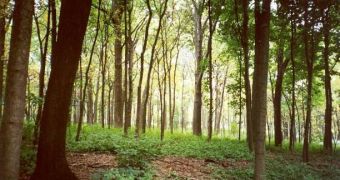According to a new scientific study released by experts at the Bournemouth University, in the United Kingdom, the historic British woodlands are losing biodiversity at a very high rate. Environmental changes, such as an increase in soil fertility and a reduction in light, related to increased canopies, have radically transformed the landscape and made the forests less distinctive than they were last century. The full results of the investigation appear in the July 22nd issue of the journal Proceedings of the Royal Society B, AlphaGalileo informs.
“We have identified the loss of unique communities within British woodlands through a comprehensive large-scale study of woodland plants. The results show that we must monitor biodiversity at the landscape scale, as well as gain a better understanding of processes affecting our native flora, if we are to conserve and restore the character of the traditional British woodland,” Bournemouth University expert Sally Keith, who is also the lead author of the new paper, explains.
Even though they fit in some general classification, local woods around the world have developed their unique traits and biodiversity, which is indigenous to that area alone, over the centuries. The British researchers observed, in their seven-decade study, that it was these ecosystems that suffered loss, not necessarily in terms of biodiversity and the number/types of species living in that certain area. As local conditions slightly change, so do the traits of the woodlands, a phenomenon that has researchers worried, and finds them with no plans to prevent that from happening.
“This study shows that increased pollution and poor countryside management has led to increasing homogenization of biodiversity in British woodlands. These two issues must be addressed in [the] future if we wish to restore the diverse woodland communities of the past,” Professor James Bullock, an expert at the Center for Ecology & Hydrology, an organization that has been also involved in the new studies, adds. Bullock is also the co-author of the journal paper. Experts from Natural England have been involved in the investigations as well.

 14 DAY TRIAL //
14 DAY TRIAL //